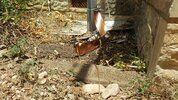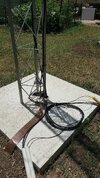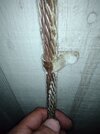Two things..
Lightning rods are designed to dissipate charge to PREVENT the strike, not to give it a target. The same principle applies to antennas. The more pointy or sharp edges it has, the better it discharges atmnosphere to ground charge separation. An antenna with a ground plane can make a great lightning rod and serve that exact purpose without the lightning ever hitting it.
Grounding the antenna may lower noise in some situations, but I think the real goal there is to dissipate stored charge. Both to mitigate pattern distortion and to protect your gear. When a coax is disconnected from the radio, the antenna can pick up static electricity quite fast and the coax, being a capacitor, can store it. Thousands of volts can build up in just seconds. Grounding prevents that so there is no charge when you connect the coax to your radio. Grounding also prevents static buildup that can distort the radiation pattern, a problem common to isolated radio/antenna systems.
The heavy gauge ground wire is just in case it does strike so your thin little "pretend" ground wire doesn't turn into an electric match and light your house on fire.




